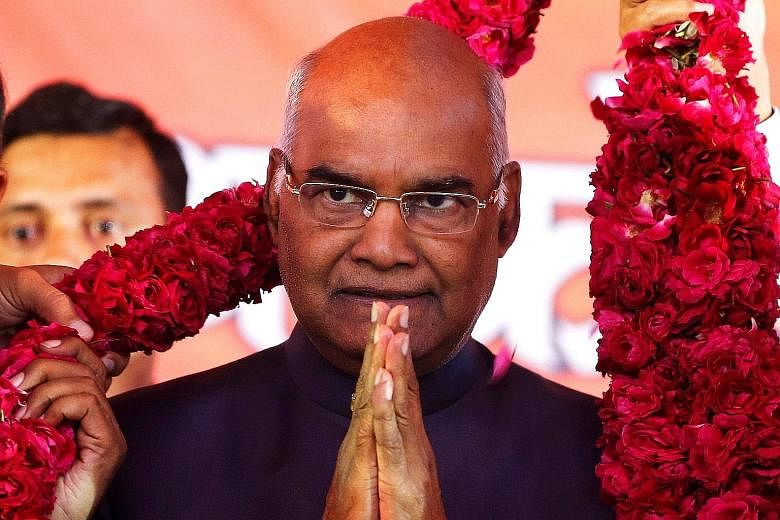Mr Ram Nath Kovind became India's 14th president yesterday, cruising past his opposition rival in a win for the ruling Bharatiya Janata Party (BJP) and Prime Minister Narendra Modi.
Mr Kovind, the BJP's candidate for the top post and a member of the Dalit community - known formerly as the "untouchables" - won 65.65 per cent of the votes from an electoral college consisting of nearly 5,000 state and federal lawmakers. He defeated opposition candidate Meira Kumar, who is also a Dalit and the country's first female Speaker of Parliament.
Mr Kovind, 71, is only the second Indian president from the Dalit community, which continues to face discrimination and ostracism in many parts of the country.
India's first Dalit president was Mr K.R. Narayanan, who held the post from 1997 to 2002.
"It is an emotional moment for me. I realise the great responsibility before me," Mr Kovind, a farmer's son, said yesterday. "I never thought I would be elected to this post, but it is a testament to hard work and working for society."
In India, the president plays a ceremonial role and acts on the advice of the government. The president gives final approval to convert legislation into law, has powers to grant pardons for death-row convicts and is the supreme commander of the armed forces.
Yet past presidents have been known to speak out on issues affecting the country, such as outgoing President Pranab Mukherjee, who spoke about the importance of tolerance and expressed anguish over the many disruptions in Parliament.
The president's term is for five years.
Opposition Congress party president Sonia Gandhi had described the election as a battle between Hindu nationalism and secularism.
But even opposition parties like the Janata Dal (United) supported Mr Kovind, whose election has once again showed the dominance of the BJP, which has a majority in Parliament and is in power in nearly half of India's states.
Firecrackers exploded and sweets were distributed outside the BJP headquarters in Delhi and in other cities, with Mr Modi tweeting his congratulations to the new president while thanking the electoral college. "Gladdened by the extensive support," he tweeted.
Sections of Dalits, who form 20 per cent of the population, also saw the victory as a win for the downtrodden community.
"We feel like the community is being uplifted. We were very happy. We were surprised when he was chosen," said Dr M.L. Mahor, general secretary of the All India Koli Samaj.
Political parties have been battling it out to woo the community, with Bahujan Samaj Party leader Mayawati, known as the "Dalit queen", even quitting Parliament on Tuesday because she was not given enough time to speak about atrocities against Dalits and minorities.
Mr Kovind succeeds Mr Mukherjee, a former Congress politician, and will take the oath next Tuesday.
SEE WORLD: The farmer's son who rose to be India's President

